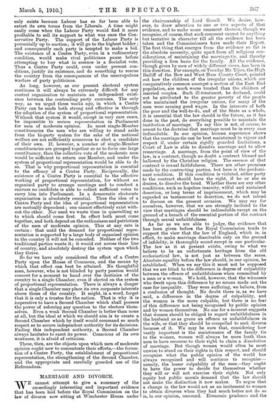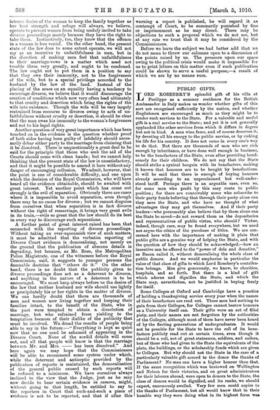MARRIAGE AND DIVORCE.
WE cannot attempt to give a summary of the exceedingly interesting and important evidence that has been laid before the Royal Commission on the law of divorce now sitting at Winchester House under the chairmanship of Lord Gorell. We desire, how- ever, to draw attention to one or two aspects of that evidence, and to make some comment thereon, though we recognise, of course, that such comment cannot be anything but tentative in character till all the evidence has been taken and the Commissioners have made their Report. The first thing that emerges from the evidence so far is the absolute necessity, quite apart from all religious con- siderations, of maintaining the marriage-tie, and thereby providing a firm basis for the family. All the evidence, though given by men of widely different views, has been in this direction. For example, on Tuesday Mr. Tijou, the High Bailiff of the Bow and West Ham County Court, pointed out how the children of the irregular unions, which are comparatively common amongst a section of the East End population, are much worse treated than the children of married couples. Such ill-treatment, he declared, could not be attributed to the greater poverty of the people who maintained the irregular unions, for many of the men were earning good wages. In the interests of both the poor and the well-to-do, and of the State as a whole, it is essential that the law should in the future, as it has done in the past, do everything possible to maintain the institution of marriage. To say this is not, of course, to assent to the doctrine that marriage must be in every case indissoluble. In our opinion, human experience shows that the marriage-tie can be best maintained in vigour and respect if, under certain rigidly guarded limitations, a Court of Law is able to dissolve marriage and to allow remarriage. A marriage, from the point of view of the law, is a contract, though no doubt a contract blessed and hallowed by the Christian religion. The essence of that contract is sexual faithfulness. There are other promises made by the contracting parties, but here is the predomi- nant condition. If this condition is violated, either party to the contract should have the right, if he or she so desires, to dissolve the bond. Whether there are any other conditions, such as hopeless insanity, wilful and sustained desertion, or long terms of imprisonment, which may be regarded as tantamount to desertion, we do not intend to discuss on the present occasion. We may say for ourselves, however, that we are strongly inclined to the view that marriages should be indissoluble except on the ground of a breach of the essential portion of the contract through sexual unfaithfulness. As far as we are able to judge, the evidence that has been given before the Royal Commission tends to support the view that the law of England, which is, in effect, to make marriage dissolvable only on the ground of infidelity, is thoroughly sound except in one particular. The law as it at present exists, owing to what we believe to be an unfortunate heritage from the old ecclesiastical law, is not just as between the sexes. Absolute equality before the law should, in our opinion, be established. When we say this it must not be supposed that we are blind to the difference in degree of culpability between the offence of unfaithfulness when committed by a, man or a woman. We hold, however, that the witnesses who dwelt upon this difference by no means made out the case for inequality. They were suffering, we believe, from a confusion of thought. No doubt there is, as we have said, a difference in the degree of culpability, and the woman is the more culpable, but there is no fear of this difference not being recognised by public opinion and by women themselves. No one for a moment suggests that women should be obliged to regard unfaithfulness in the husband as as grave an offence as unfaithfulness in the wife, or that they should be compelled to seek divorce because of it. We may be sure that, considering how vastly important is the maintenance of the family tie to the woman, women will always be more loath than men to have recourse to their right to claim a dissolution of marriage. But though women would often be most unwise to stand on their rights in this respect, and should recognise what the public opinion of the world has always recognised and will continue to recognise— namely, the lesser culpability of the man—they ought to have the power to decide for themselves whether they will or will not exercise their rights. Not only equity but public morals demand that the law should not make the distinction it now makes. To argue that a change in the law would act as an incitement to women to obtain divorces when they had much better not do so is, in our opinion, unsound. Economic prudence and the intense desire of the woman to keep the family together as her best strength and refuge will always, we believe, operate to prevent women from being unduly incited to take divorce proceedings merely because they have the right to take them. Instinctively, too, they know that the offence in a woman is less venial. On the other hand, the present state of the law does to some extent operate, we will not say as an incentive to unfaithfulness in men, but in the direction of making men feel that unfaithfulness to their marriage-vows is a matter which need not trouble them very greatly, and ought to be condoned. The law ought not to put them in a position to say that they owe their immunity, not to the forgiveness of the wife, but to a special privilege accorded to the husband by the law of the land. Instead of the placing of the sexes on an equality having a tendency to encourage divorce, we believe that it would discourage the creation of conditions which now very often lead ultimately to that cruelty and desertion which bring the rights of the wife into existence. Though the wife will be very largely restrained from recourse to divorce owing to acts of un- faithfulness without cruelty or desertion, it should be clear that the man owes his immunity to the woman's forgiveness and not to his legal rights.
Another question of very great importance which has been touched on in the evidence is the question whether proof of both sides having been guilty of infidelity should neces- sarily debar either party to the marriage from claiming that it be dissolved. There is unquestionably a great deal to be said for the principle that those who seek the aid of the Courts should come with clean hands ; but we cannot help thinking that the present state of the law is unsatisfactory, and that it might be possible to amend it here without any danger of encouraging collusion. We admit, however, that the point is one of considerable difficulty, and one upon which the decision of the Royal Commission, who will have heard all the evidence obtainable, should be awaited with great interest. Yet another point which has come out strongly is the evil of separation. Obviously there are cases where it is impossible to avoid separation, even though there may be no cause for divorce ; but we cannot disguise from ourselves that when separation is in fact divorce without the right of remarriage, it brings very great evils in its train,—evils so great that the law should do its best in every way to discourage such separations.
A further point of great interest raised has been that connected with the reporting of divorce proceedings. Without taking an over-squeamish view of such matters, it must be admitted that the verbatim reporting of Divorce Court evidence is demoralising, not merely on the ground that the publication of obscene details is degrading, but because, as Mr. Rose, the Metropolitan Police Magistrate, one of the witnesses before the Royal Commission, said, it suggests to younger persons the damnable doctrine that " others do it." On the other hand, there is no doubt that the publicity given to divorce proceedings does act as a deterrent to divorce, and anything in the nature of a deterrent is to be encouraged. We must keep always before us the desire of the law that neither husband nor wife should use lightly or precipitately his or her rights in the matter of divorce. We can hardly doubt that there are thousands of men and women now living together and keeping their families intact, to the benefit of the State, who in the past were tempted to obtain a dissolution of marriage, but who refrained from yielding to the temptation because of their dislike of the publicity that must be involved. We dread the results of people being able to say in the future :—" Everything is kept so quiet now that no one need be ashamed of appearing in the Divorce Court. None of the sordid details will come out, and all that people will know is that the marriage
between Mr. and Mrs. has been dissolved." And here again we may hope that the Commissioners will be able to recommend some system under which, while the deterrent and antiseptic provided by the publication of reports is maintained, the demoralisation of the general public caused by such reports will be reduced to a minimum. We have ourselves always inclined to the view that the Judge, just as he may now decide to hear certain evidence in camera, might, -without going to that length, be entitled to say to the reporters in Court that such-and-such a piece of evidence is not to be reported, and that if after this warning a report is published, he will regard it as contempt of Court, to be summarily punished by fine or imprisonment as he may direct. There may be objections to such a proposal which we do not see, but at any rate we trust that it may be considered by the Commissioners.
Before we leave the subject we had better add that we do not mean to throw our columns open to a discussion of the points raised by us. The pressure upon our space owing to the political crisis would make it impossible for us to print letters on this matter even if such publication could be shown to serve a useful purpose,—a result of which we are by no means sure.















































 Previous page
Previous page